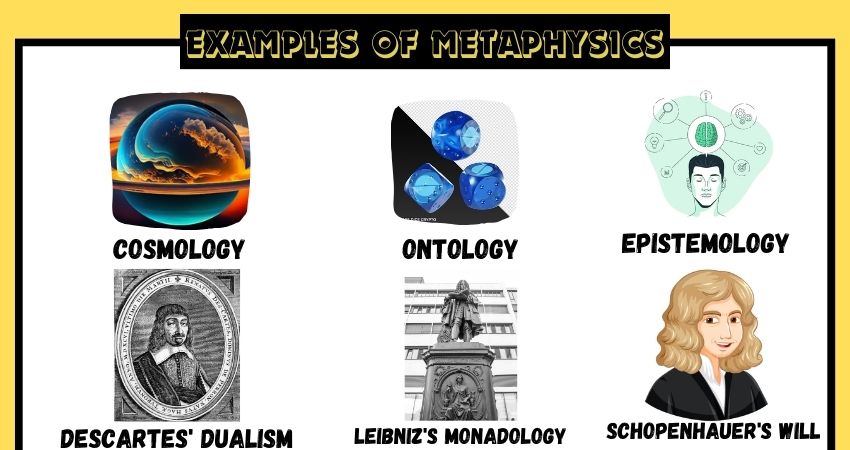Metaphysics, the branch of philosophy that explores the fundamental nature of reality and existence, delves into questions beyond the scope of empirical observation. It seeks to understand the nature of being, reality, and the relationships between mind and matter. In this exploration of metaphysics, we will explore various examples that illustrate its diverse facets.
Definition of Metaphysics
Metaphysics goes beyond the tangible and observable, examining the underlying principles that govern the universe. It addresses questions about the nature of existence, causation, time, space, and the relationship between mind and matter.
Types of Metaphysical Concepts
- Ontology:
- Ontology deals with the nature of being and existence. Examples include discussions about the existence of abstract entities such as numbers or the nature of reality itself.
- Cosmology:
- Cosmology within metaphysics investigates the origin, structure, and ultimate fate of the universe. Concepts like the nature of time, space, and the multiverse fall under this category.
- Epistemology:
- Epistemology explores the nature and limits of human knowledge. It delves into questions about perception, belief, and the relationship between the mind and reality.
Examples of MetaPhysics
1. Ontology:
The study of the nature of being and existence, delves into questions about what exists and how entities relate to one another.
2. Cosmology:
The exploration of the origin, structure, and ultimate fate of the universe, encompassing inquiries into the nature of time, space, and the cosmos.
3. Epistemology:
An investigation into the nature and limits of human knowledge, examining how we acquire, justify, and organize beliefs.
4. Plato’s Theory of Forms:
Proposes that non-material forms, such as beauty or justice, represent the true reality, and the material world is a reflection or imperfect instantiation of these forms.
5. Aristotle’s Hylomorphism:
Suggests that everything in the world is a combination of matter and form, with form giving identity and structure to matter.
6. Descartes’ Dualism:
Asserts a fundamental separation between the mind (non-material) and the body (material), proposing that they interact at the pineal gland.
7. Leibniz’s Monadology:
Posits that the basic substance of the universe is indivisible entities called monads, each representing a unique perspective on the entire universe.
8. Kant’s Transcendental Idealism:
Argues that our knowledge of the world is shaped by our perceptions, and reality is a combination of experience and the inherent structure of the mind.
9. Schopenhauer’s Will:
Identifies the fundamental force underlying reality as an all-encompassing “will” that drives all phenomena.
10. Nietzsche’s Eternal Recurrence:
Puts forth the idea that all events in life, including our actions and experiences, will recur infinitely in an eternal cycle.
11. Whitehead’s Process Philosophy:
Views reality as a process of constant change and becoming, emphasizing the interconnectedness of events.
12. Heidegger’s Being and Time:
Explores the concept of “Being” and its relationship with time, examining how our understanding of existence is shaped by temporality.
13. Sartre’s Existentialism:
Emphasizes individual freedom, choice, and responsibility in creating one’s essence, rejecting inherent meaning and urging individuals to define their existence.
14. Deleuze’s Rhizome:
Describes a non-hierarchical, interconnected way of understanding reality, rejecting linear and hierarchical structures in favor of a networked model.
15. Bergson’s Duration:
Focuses on the subjective experience of time as duration, challenging the conventional understanding of time as a measurable, linear concept.
16. Camus’ Absurdism:
Argues that life’s inherent lack of meaning is at the core of human existence, and individuals must confront and embrace the absurdity of life.
17. Process Theology:
Views God as a changing, evolving entity rather than an unchanging being, emphasizing the dynamic and relational nature of the divine.
18. Panpsychism:
Suggests that consciousness is a fundamental property of the universe, proposing that all entities, not just humans, possess some level of consciousness.
19. Holism:
Views reality as a whole, where the parts are interconnected and cannot be understood in isolation, emphasizing the importance of the systemic perspective.
20. Derrida’s Deconstruction:
Challenges traditional binary oppositions and hierarchical structures in language and thought, emphasizing the instability and fluidity of meaning.
Conclusion: In conclusion, metaphysics opens the door to profound philosophical inquiries that extend beyond the tangible world. The examples discussed, from Plato’s Forms to Descartes’ Dualism, showcase the richness and diversity of metaphysical thought. Exploring these concepts not only deepens our understanding of philosophy but also prompts contemplation about the very nature of our existence

